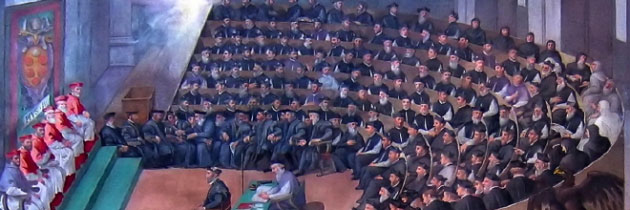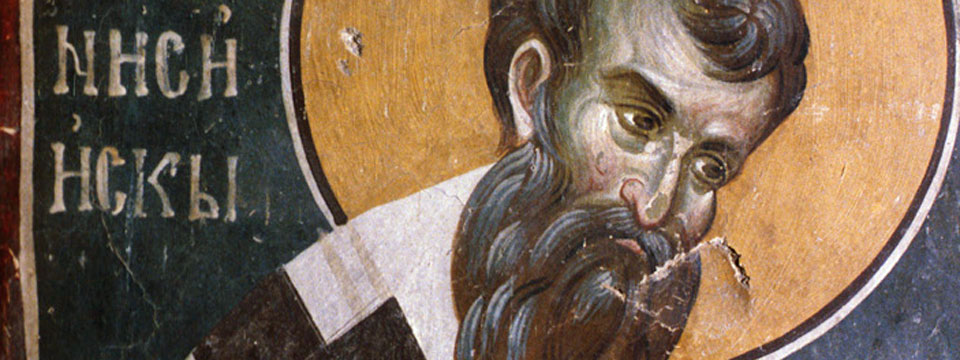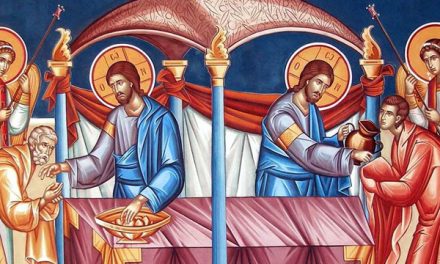- What grace is
- The teaching of the Council of Trent: Decree on Justification
- The Protestant errors regarding grace and justification
- The controversies between the Jesuits and Dominicans in the 16th century and beyond
- A passage by Matthias Scheeben on grace
These articles derive from a paper Fr Peter Joseph tabled at the 2012 ACCC Conference, Grace and Justification: Trent and later controversies.
Decree on Justification
In doctrinal matters (as opposed to disciplinary—decrees of reform), Trent began by professing the Nicene Creed (Session 3 in 1546), and then dealt, first, with the Canon of Scripture (Session 4 in 1546: defining the full canon for the first time); then Original Sin (Session 5 in 1546); then came the major topic of Justification (Session 6 in 1547).
In a sense, Justification was the major thing to be resolved – before the Council could talk about the number of the Sacraments, their nature and effects, Purgatory, and so on.
At Vianney College, in my lectures on Grace, we read the complete Decree of Trent on Justification – 17 small chapters and the 33 canons. I said this to Fr Richard Aladics of Yorkshire diocese (he’s at this Good Shepherd Seminary) – and he said they read the decree fully at the English College of Valladolid, Spain. Anyway, in case you haven’t seen it or read it, I’ve left copies here to collect at the end of the talk.
The theological note, De fide, applies to Trent’s entire Decree on Justification, as the expressions of the Preface make clear:
“the Council of Trent … intends … to expound to all the faithful of Christ the true and sound doctrine of … Justification; … most strictly forbidding that anyone henceforth presume to believe, preach, or teach otherwise than is defined and declared in this present decree.”
When a Council speaks infallibly;
the case of Vatican II
People ask, “Is Vatican II infallible?” There was a debate over this in the Letters to the Editor of AD2000 about a year ago. Vatican Council II made no proclamations infallibly, but it did repeat many teachings already proclaimed infallibly by the Church.
A General Council only speaks infallibly when promulgating a Creed, or doctrinal canons, or a doctrine or decree to which it attaches a note expressing, in some way, that the teaching therein is the faith of the Church and no one may teach or hold otherwise: another example of such is Trent’s preface to its 1551 Decree on the Holy Eucharist:
“… forbidding all the faithful to presume to believe, teach or preach henceforth concerning the Holy Eucharist otherwise than is defined and declared in this present decree.” (DS 1635)
Remember there are 3 ways that the Church teaches infallibly: 1. Ordinary universal teaching declared by the Pope and Bishops unanimously in their day-to-day teaching. 2. Definitions of Councils. 3. Definitions of Popes.
Vatican II quoted or paraphrased or re-asserted teachings given infallibly by earlier Popes or Councils or Bishops. For example:
- it mentioned the Real Presence of Christ in the Eucharist (defined by Trent);
- it re-asserted the Immaculate Conception and the Assumption (defined by Popes in 1854 and 1950);
- the Council also repeated the teaching delivered infallibly by the ordinary and universal magisterium, when, for example, it said that Christ founded the Church.
When Pope Benedict on Easter Sunday morning proclaims to the crowds at St Peter’s Piazza, “Christ is risen,” he is not speaking infallibly, but is repeating what has already been proclaimed infallibly by Councils, in Creeds.
The two dogmatic constitutions of Vatican II (on the Church and on Revelation), in themselves, were not proclaimed infallibly, but are on the same level as Papal and Episcopal ordinary statements—not solemn, not infallible, but authoritative (or authentic – authenticus in mediæval Latin means authoritative). And just as Papal statements can be graded as higher and more serious when addressed to the universal Church, or having lesser authority when delivered to select audiences, for example, so too, a statement from Vatican II has a higher authority within the ordinary level, since it comes from a Council; and within the Council itself there are rankings of “dogmatic constitutions” above the “pastoral constitution” and the “declarations.”
A General Council can err when not defining. For instance, the Council of Florence, in its Decree for the Armenians (returning to union with Rome) issued in 1439 said: “The sixth sacrament is Order, the matter of which is that through the handing over (traditio) of which the Order is conferred, just as the priesthood is transmitted through the presentation (porrectio) of the chalice with the wine, and the paten with bread … The form of this priesthood is: ‹‹Receive the power to offer sacrifice in the Church for the living and the dead, in the name of the Father and of the Son and of the Holy Spirit››.” (DS 1326)
Pius XII in 1947, in Sacramentum Ordinis, differed on both the matter and the form of Priesthood — but how could he over-ride a decree of a General Council? We have to explain by saying that the Council’s decree was not a solemn (& therefore infallible) definition, but a convenient presentation of doctrine on the seven Sacraments, presenting the common theology of the time, without the intention to define. It is lacking the marks of a solemn definition. Looking closely at the decree of the Council, we see it contains first a Creed, and then acceptance of the definitions of Chalcedon, and other things; and then, fifth in line, a section on each of the Sacraments, which is described as a “very brief formula…for the sake of an easier instruction of the Armenians”. It is almost verbatim from an opusculum (De articulis fidei) of St Thomas.
The bars of the Second Vatican Council: I had a lecturer in dogmatic theology in Rome, Father Renzo Lavatori, a great theologian and writer, a good Thomist, and he told us that when he was a seminarian during Vatican II, he had the job with others of distributing papers to the Council Fathers at the start of each session, and in between sessions, everyone could go for a coffee or refreshment at the two bars set up at each end of St Peter’s Basilica—and because of the types that gathered at each one, they became known as Bar-Jonas, and Bar-rabbas!
Trent has highly developed teaching on the bestowal or increase or loss or re-acquisition of grace—yet, interestingly, it never defines grace; it never explicitly distinguishes between sanctifying grace and actual grace; it never says whether grace is a substance or an accident, whether it is a habit or a quality, and so on. I read in Hubert Jedin that two men who contributed greatly to the text were Cardinal Cervini, and the General of the Augustinians, Father Seripando.
Chapter 1: The inability of Nature and of the Law to justify man
All men had lost innocence in the sin of Adam and were under the power of the devil and of death. Neither the Gentiles, by force of nature, nor the Jews by the law of Moses, were able to be liberated therefrom; even though free-will remained in them, though weakened.
Chapter 2: The Dispensation and Mystery of Christ’s Advent
God the Father sent His own Son Jesus Christ, both to redeem the Jews who were under the Law, and the Gentiles, that all might receive the adoption of sons.
Chapter 3: Who are justified through Christ
“Though He died for all (2 Cor 5:15), yet not all receive the benefit of His death, but only those to whom the merit of His passion is communicated.” Only through being born again in Christ is there bestowed upon us, through the merit of His passion, the grace whereby we are made just and transferred to the kingdom of light.
Obiter dictum: on all being saved
Trent’s decree rules out von Balthasar’s opinion that all will be saved: the decree declares, at the start of chapter 3, quote: “Although ‘He died for all’, not all, however, receive the benefit of His death, but only those to whom the merit of His Passion is communicated.” (DS 1523). Therefore, if you say all will be saved, you have incurred the anathema of Trent which declares in the preface to the decree, that it is “most strictly forbidding that anyone henceforth presume to believe, preach, or teach otherwise than is defined and declared in this present decree.” Some had reservations about von Balthasar getting the red hat – and so did God: God let him receive nomination as Cardinal, but He took him by death before he got to receive the red hat.
Chapter 4: A brief description of the Justification of the sinner, and its mode in the state of grace
Justification of the sinner is a transferral from that state wherein man is born a child of the first Adam, to the state of grace, and of adoption as sons of God through the second Adam, Christ our Saviour. Since the promulgation of the Gospel, this transferral cannot be effected without Baptism or desire for it, as it is written: Unless a man be born again of water and the Holy Spirit, he cannot enter the Kingdom of God. (Jn 3:5)
Chapter 5: The necessity, in adults, of preparation for Justification, and whence it proceeds
“The Synod furthermore declares, that in adults the beginning of the said Justification is to be derived from the prevenient [pre-disposing] grace of God through Jesus Christ, that is, from His calling whereby, without any existing merits on their part, they are called; that they who by sin were alienated from God, may be disposed through his arousing and assisting grace, to convert themselves to their own justification, by freely assenting to and co-operating with that said grace: so while God touches the heart of man by the illumination of the Holy Spirit, man himself is neither utterly inactive while he receives that inspiration, inasmuch as he is also able to reject it; yet he is not able, by his own free will, without the grace of God, to move himself unto justice in His sight. Hence when it is said in the Scriptures: Turn to me and I will turn to you (Zach 1:3), we are admonished of our liberty; and when we answer: Convert us, O Lord, to You, and we shall be converted (Lam 5:21), we confess that we are anticipated [‘pre-vented’ – preceded] by the grace of God.”
Chapter 6: The manner of preparation
Adults are disposed to that justice, when, aroused and aided by divine grace, they come to faith, and are freely moved towards God.
Chapter 7: In what the Justification of the sinner consists, and what are its causes
This disposition or preparation is followed by Justification itself, which is not merely remission of sins, but also the sanctification and renewal of the inner man, through the voluntary reception of grace and of the gifts whereby an unjust man becomes just, and from being an enemy becomes a friend and an heir to everlasting life.
Trent then applies the four causes of Aristotle regarding the bestowal of grace—except that a material cause (which cannot be for a spiritual reality) is replaced by an instrumental cause, namely, Baptism.
“The causes of this Justification are:
- the final cause, namely, is the glory of God and of Christ, and life everlasting;
- while the efficient cause is the merciful God who washes and sanctifies (1 Cor 6:11) gratuitously, sealing and anointing with the Holy Spirit of promise, who is the pledge of our inheritance (Eph 1:13-14),
- but the meritorious cause is His most beloved Only-begotten, our Lord Jesus Christ, who, when we were enemies (Rom 5:10), for the abounding charity wherewith He loved us (Eph 2:4) merited Justification for us by His most holy Passion on the wood of the cross, and made satisfaction for us to God the Father;
- now the instrumental cause is the Sacrament of Baptism, which is the sacrament of faith, without which [faith] no man is ever justified; (Heb 11)
- finally, the sole formal cause is the justice of God, not that by which He Himself is just – [thus the error of identifying grace with the Holy Spirit is rejected]{{14}} – but that whereby He makes us just, that, namely, with which we, being endowed by Him, are renewed in the spirit of our mind (Eph 4:23) and we are not only reputed, but are truly called, and are just, receiving justice within us, each one according to his own measure, which the Holy Spirit distributes to every one as He wills (1 Cor 12:11) and according to each one’s disposition and co-operation. For, although no one can be just, but he to whom the merits of the Passion of our Lord Jesus Christ are communicated, yet this is done in the said justification of the sinner, when by the merit of that same most holy Passion, the charity of God is poured forth by the Holy Spirit in the hearts (Rom 5:5) of those who are justified, and inheres in them; whence, man, through Jesus Christ, in whom he is ingrafted, receives, in that justification, together with the remission of sins, all these [gifts] infused at once: faith, hope, and charity. For faith, unless hope and charity be added thereto, neither unites man perfectly with Christ, nor makes him a living member of His body. For which reason it is most truly said that Faith without works is dead (Jam 2:17) and profitless; and In Christ Jesus neither circumcision avails anything nor uncircumcision, but faith that works by charity (Gal 5:6).”
Chapter 8: How the gratuitous justification of the sinner by faith is to be understood
“And when the Apostle says that man is justified by faith and freely (Rom 3:24; 5:1), those words are to be understood in that sense which the perpetual unanimity of the Catholic Church has held and expressed; namely, that we are therefore said to be justified by faith, because faith is the beginning of human salvation, the foundation and the root of all Justification; without which it is impossible to please God (Heb 11:6); and we are therefore said to be justified freely, because none of those things which precede justification—whether faith or works—merits the grace itself of justification. For, if by grace, it is not now by works, otherwise, as the same Apostle says, grace is no more grace.” (Rom 11:6)
Chapter 9: Against the vain confidence of heretics
But, though it is necessary to believe that sins neither are remitted, nor ever were remitted except gratuitously by divine mercy for Christ’s sake; yet is it not to be said that sins are forgiven, to anyone who boasts of his confidence and certainty of the remission of his sins, and rests on that alone; seeing that it may exist, indeed does in our troubled days exist, among heretics and schismatics; and with great vehemence is this vain confidence, alien from all godliness, preached in opposition to the Catholic Church. But neither is this to be asserted—that they who are truly justified must, without any doubting whatever, settle within themselves that they are justified, and that no one is absolved from sins and justified, but he that believes for certain that he is absolved and justified; and that absolution and justification are effected by this faith alone: as though whoever lacks this belief, doubts the promises of God and the efficacy of the death and resurrection of Christ. For even as no pious person ought to doubt of the mercy of God, of the merit of Christ, and of the virtue and efficacy of the sacraments, even so each one, when he considers himself, and his own weakness and indisposition, may have fear and apprehension concerning his own grace; seeing that no one can know with the certainty of faith, which cannot be subject to error, that he has obtained the grace of God.
Chapter 10: On the increase of Justification received
Having, therefore, been justified, and made friends of God, advancing from virtue to virtue (Ps 83:8) they are renewed, as the Apostle says, day by day (2 Cor 4:16), through the observance of the commandments of God and of the Church, faith co-operating with good works, and so they increase in that justice received through the grace of Christ, and are further justified, as it is written: He that is just, let him be justified still (Apoc 22:11). The Church begs for this increase of justification when she prays, “Grant unto us, O Lord, an increase of faith, hope, and charity.” (Roman Missal, Sun 13 post Pentecost; now Collect of Sun 30)
Chapter 11: On keeping the Commandments, and on the necessity and possibility thereof
But no one, however much justified, should think himself exempt from the observance of the commandments; no one should use that rash saying, one prohibited by the Fathers under an anathema, that the observance of God’s commandments is impossible for one who is justified. “For God does not command impossibilities, but, by commanding, both admonishes you to do what you can, and to pray for what you can not,” (St Augustine, On Nature and Grace 43:50) and aids you that you may be able; whose commandments are not heavy (1 John 5:3), whose yoke is sweet, and burden light (Matt 11:30). For they who are the sons of God love Christ; but they who love Him keep His commandments (John 14:15, 23), as He Himself testifies; which indeed with divine help they can do. For though during this mortal life, men, however holy and just, at times fall into at least light and daily sins, which are also called venial, they do not on that account cease to be just. For that cry of the just, forgive us our trespasses (Matt 6:12), is both humble and true. For God does not forsake those who have been once justified by His grace, unless He be first forsaken by them.
Wherefore, no one ought to flatter himself with faith alone, thinking that by faith alone he is made an heir, and will obtain the inheritance, even though he not suffer with Christ, that he may also be glorified with Him (Rom 8:17). For which reason, the same Apostle admonishes the justified, saying: Do you not know that they who run in the race all run indeed, but only one receives the prize? So run that you may win. I therefore so run, not as at an uncertainty; I so fight, not as one beating the air, but I chastize my body, and bring it into subjection; lest perhaps when I have preached to others, I myself should become a castaway (1 Cor 9:24, 26-27). So also the prince of the Apostles, Peter: Labour the more that by good works you may make sure your calling and election. (2 Pet 1:10). They are opposed to the orthodox doctrine of religion who assert that the just man sins at least venially in every good work, or (what is more intolerable) that he merits eternal punishments; as also those who state that the just sin in all their works, if in order to arouse their laziness and to encourage themselves to run the race, they, in addition to this, that above all God may be glorified, have in view also the eternal reward.
Infallibly proclaimed moral teaching
By the way, whoever says that the Church has never defined any moral teaching (in a decree or a canon) has never read Trent (in other words, never studied at Vianney College, Wagga Wagga – or Valladolid). Chapter 11 of this Decree is all about the relevance of the Ten Commandments to Christians, and their binding force in the New Law (denied by Luther). Also, Canon 2 after Trent’s Decree on Matrimony (1563) says, “If anyone say it is lawful for Christians to have several wives at the same time; and that this is not prohibited by any divine law, anathema sit.” – A dogmatic canon regarding morality.
Now, the American Jesuit, who taught at the Gregorian University for a number of years, Fr Francis Sullivan, and others following him, say that the Church has never taught any moral doctrine infallibly. They even deny the Church could ever define a moral teaching (or only a revealed moral doctrine, not a point of the natural law). That error, is technically what in theology is called the error of a drongo. Vatican I defined the conditions for Papal infallibility, saying that the Pope speaks infallibly, under certain conditions, “when he defines a doctrine concerning faith or morals”: the phrase is “de fide et moribus”.
Chapter 12: Rash presumption in the matter of Predestination is to be avoided
No one, so long as he lives in this mortal life, ought to presume for certain that he is assuredly in the number of the predestined; as if he that is justified either cannot sin any more, or, if he does sin, ought to promise himself an assured repentance; for except by a special revelation, it cannot be known whom God has chosen for Himself.
Chapter 13: The gift of Perseverance
So also as regards the gift of perseverance—which cannot be derived from any other but Him who is able to establish him who stands that he stand perseveringly, and to restore him who falls:—let no one herein promise himself anything as certain with an absolute certainty; though all ought to place and repose a most firm hope in God’s help. For unless men be themselves lacking in His grace, God, as He has begun the good work, so will He perfect it, working (in them) to will and to accomplish. (Phil 1:6; 2:13) Nevertheless, let those who think themselves to stand, take heed lest they fall (1 Cor 10:12), and, with fear and trembling work out their salvation (Phil 2:12), in labours, in watchings, in alms-deeds, in prayers and oblations, in fastings and chastity: for, knowing that they are born again unto a hope of glory, but not as yet unto glory, they ought to fear for the combat which yet remains with the flesh, with the world, with the devil, wherein they cannot be victorious unless with God’s grace they be obedient.
Chapter 14: The fallen, and their restoration
As regards those who by sin have fallen from the received grace of Justification, they can again be justified, when, God, arousing them, they shall by Christ’s merits and through the sacrament of Penance recover the grace lost. For those who fall into sins after baptism, Christ instituted the sacrament of Penance, when he said, Receive the Holy Spirit: whose sins you shall forgive, they are forgiven them, and whose sins you shall retain, they are retained. (Jn 20:22, 23).
Chapter 15: By every mortal sin, grace is lost, but not faith
The grace of Justification is lost, not only by unbelief whereby even faith itself is lost, but also by any other mortal sin whatever, even when faith is not lost. The divine law excludes from the kingdom of God not only the unbelieving, but also believers who are fornicators, adulterers, perverts, sodomites, thieves, covetous, drunkards, slanderers, extortioners (1 Cor 6:9-10) and all others who commit deadly sins; from which, with the help of divine grace, they can refrain.
Chapter 16: The fruit of Justification, that is, the merit of good works, and the nature of that merit
Therefore, before men who have been justified in this manner—whether they have preserved uninterruptedly the grace received, or whether they have recovered it when lost—are to be set the words of the Apostle: Abound in every good work, knowing that your labour is not in vain in the Lord (1 Cor 15:58), for God is not unjust, that He should forget your work, and the love which you have shown in His name (Heb 6:10) and, do not lose your confidence, which has a great reward. (Heb 10:35) And, for this cause, life eternal is to be offered to those working well unto the end (Matt 10:22) and hoping in God, both as a grace mercifully promised to the sons of God through Jesus Christ, and as a reward which is according to the promise of God Himself, to be faithfully rendered to their good works and merits. For, since Christ Jesus Himself continually infuses His virtue into the said justified—as the head into the members, and the vine into the branches—and this virtue always precedes and accompanies and follows their good works, which without it could not in any way be pleasing and meritorious before God—we must believe that nothing further is wanting to the justified, to prevent their being accounted to have, by those very works which have been done in God, fully satisfied the divine law according to the state of this life, and to have truly merited eternal life, to be obtained also in its due time. Thus, neither is our own justice established as our own as from ourselves (Rom 10:3; 2 Cor 3:5), nor is the justice of God ignored or repudiated: for that justice which is called ours, because we are justified from its being inherent in us, that same is (the justice) of God, because it is infused into us by God, through the merit of Christ. Neither is this to be omitted—that although in the sacred writings so much is attributed to good works, that Christ promises, that even he that shall give a drink of cold water to one of His least ones, shall not lose his reward (Matt 10:42), and the Apostle testifies that, That which is at present momentary and light of our tribulation, works for us above measure exceedingly an eternal weight of glory (2 Cor 4:17), nevertheless far be it that a Christian should either trust or glory in himself, and not in the Lord (1 Cor 1:31; 2 Cor 10:17), whose bounty towards all men is so great, that He will have the things which are His own gifts to be their merits. And since in many things we all offend (Jam 3:2), each one ought to have before his eyes not only the severity and judgment, as well as the mercy and goodness (of God); neither ought anyone to judge himself, even though he be not conscious to himself of anything (1 Cor 4:3-4); because the whole life of man is to be examined and judged, not by the judgment of man, but of God who will bring to light the hidden things of darkness and make manifest the counsels of the hearts, and then shall every man have praise from God (1 Cor 4:5), who, as it is written, will render to every man according to his works (Matt 16:27; Rom 2:6; Apoc 22:12).
Journet on merit
God sets in us the sap of grace and of charity, with which we can produce repeated acts of grace and charity with growing intensity; they are the fruits, and the final fruit will be entrance into the heavenly kingdom. Merit is a title to reward in justice. But can God be obliged in justice towards us? Can there be any proportion between what we give Him—we who have received all we possess from Him—and the supreme gifts of His grace and His love? Not, indeed, if we are left to ourselves and our own efforts. But there is, if He sets in us the sap of His grace and love, and asks us to make it bear fruit in still further grace and love. Our very merits are the gifts of God. Hence the saying of St Augustine: “When God crowns our merits, He crowns His own gifts.”{{15}}
But are they our merits or the merits of Christ? The Protestant procedure, here as elsewhere, is to oppose instead of to subordinate. To the merits of Christ alone it opposes the merits of man alone. It pronounces for salvation by the merits of Christ alone, and imputes to us the theory of salvation by the merits of man alone, the Pelagian view condemned by the Church as heretical. What, then, is the real Catholic doctrine? It is summed up in one sentence: our merits are from God and Christ as first cause, and from us as second cause: God gives us, in Christ, the power to assent to Him. We recur to Christ’s comparison: “I am the vine, and you the branches. He that abides in me bears much fruit.” Does the fruit come from the trunk (Christ) or the branches (us)? From the trunk through the branch.
We cannot merit the first grace of all; it is always an antecedent gift. But once in the state of charity, we can always, through charity, merit an ever greater degree of charity and, at the moment of death, eternal life.
Trent then summarises the chief points of the decree, in 33 canons, all ending with “anathema sit.”
[[14]]Piolanti, p. 523; Garrigou-Lagrange, p. 120.[[14]]
[[15]]“cum Deus coronat merita nostra, nihil aliud coronet quam munera sua?” Letter 194 to Pope Sixtus, no. 19[[15]]






